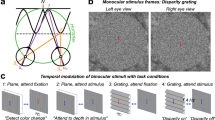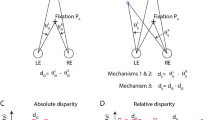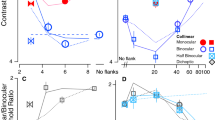Abstract
Stereoscopic depth perception is based on measuring tiny differences between the two eyes' images which arise as a result of binocular parallax1. Julesz2 used random-dot stereograms to demonstrate that stereopsis may be based on a simple point-to-point comparison of the two eyes' images and does not require the presence of monocularly visible forms or contours. Here we present a new class of stereograms which illustrate that monocular subjective contours3–5 can influence the matching of elements in a stereogram even though the elements themselves convey no disparity information. More specifically, the depth seen from such contours is automatically attributed to texture elements and lines that are enclosed by these contours—an illusion that we call ‘stereoscopic capture’.
This is a preview of subscription content, access via your institution
Access options
Subscribe to this journal
Receive 51 print issues and online access
$199.00 per year
only $3.90 per issue
Buy this article
- Purchase on Springer Link
- Instant access to full article PDF
Prices may be subject to local taxes which are calculated during checkout
Similar content being viewed by others
References
Wheatsone, C. H. Phil. Trans. R. Soc. 128, 371–394 (1983).
Julesz, B. Foundations of Cyclopean Perception (University of Chicago Press, 1971).
Schumann, F. Z. Psychol. 1, 23, 1–32 (1904).
Kanizsa, G. Riv. Psicol. norm. patol. appl. 49, 7–30 (1955).
Rock, I. The Logic of Perception (MIT Press, London, 1983).
Lie, I. Scand. J. Psychol. 6, 109–116 (1965).
Blomfield, S. Nature new Biol. 245, 147 (1973).
Harris, J. P. & Gregory, R. L. Perception 2 (2), 235–247 (1973).
Ramachandran, V. S., Rao, V. M. & Vidyasagar, T. R. Nature 242, 412–414 (1973).
Ramachandran, V. S. & Inada, V. Spatial Vision Vol. 1 (in the press).
Ramachandran, V. S. & Cavanagh, P. Vision Res. (submitted).
Mitchison, G. & McKee, S. Nature 315, 402–404 (1985).
Julesz, B. & Chang, J. J. Biol. Cybernet. 22, 107–119 (1976).
Marr, D. & Poggio, T. Proc. R. Soc. B24, 301–328 (1979).
Barlow, H. B., Blakemore, C. & Pettigrew, J. D. J. Physiol., Lond. 193, 327–342 (1967).
Pettigrew, J. D., Nikara, T. & Bishop, P. O. Expl Brain Res. 6, 391–410 (1968).
Fischer, F. & Poggio, G. F. Proc. R. Soc. B204, 409–414 (1979).
Hubel, D. H. & Wiesel, T. N. Nature 225, 41–42 (1970).
Clarke, P. G. H., Donaldson, I. M. L. & Whitteridge, D. J. Physiol., Lond. 256, 509–526 (1976).
Ramachandran, V. S., Clarke, P. G. H. & Whitteridge, D. Nature 268, 333–335 (1977).
Van der Heydt, R., Peter Hans, E. & Baumgartner, G. Science 224, 1260–1262 (1984).
Author information
Authors and Affiliations
Rights and permissions
About this article
Cite this article
Ramachandran, V., Cavanagh, P. Subjective contours capture stereopsis. Nature 317, 527–530 (1985). https://doi.org/10.1038/317527a0
Received:
Accepted:
Published:
Issue Date:
DOI: https://doi.org/10.1038/317527a0
This article is cited by
-
Illusory occlusion affects stereoscopic depth perception
Scientific Reports (2018)
-
Two-dimensional matches from one-dimensional stimulus components in human stereopsis
Nature (1998)
-
Quantitative stereoscopic depth without binocular correspondence
Nature (1994)
-
Perceptual rivalry between illusory and real contours
Biological Cybernetics (1991)
-
An occlusion-related mechanism of depth perception based on motion and interocular sequence
Nature (1988)
Comments
By submitting a comment you agree to abide by our Terms and Community Guidelines. If you find something abusive or that does not comply with our terms or guidelines please flag it as inappropriate.



